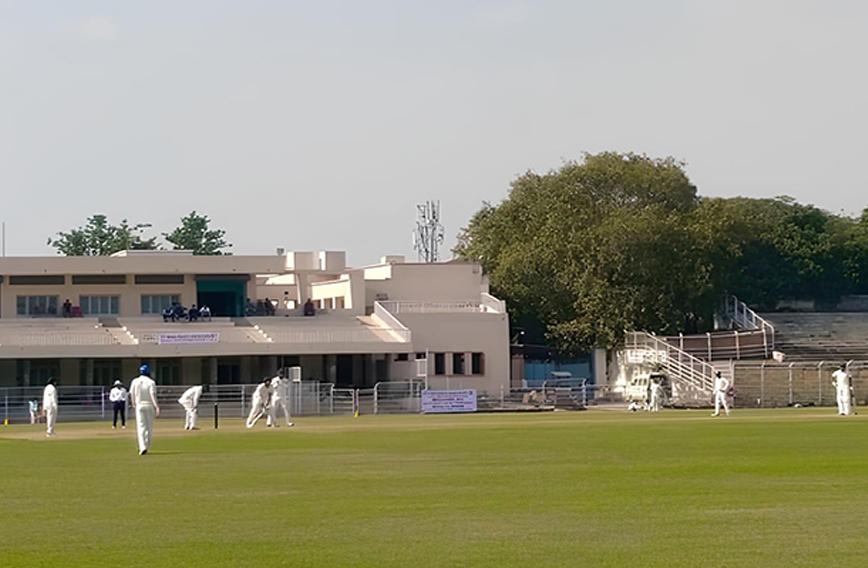
Moin-ul-Haq Stadium in Patna, Bihar
The route to jobs in Bihar now is sport
Rinku Kumari, Muzaffarpur
Youth in Bihar’s villages is being increasingly drawn to sports, lured by the prospect of promising careers, financial rewards and government job opportunities.
Cricket and football clubs have sprouted in remote rural areas alongside burgeoning sports competitions. The government is also actively promoting sports. Yet challenges remain. There is politics in sports associations, casteism, discrepancies in fund allocation, and delayed payments. All these tend to impede the progress of players to national and international tournaments.
Nitish, a dedicated cricketer from Arnia village in Vaishali district, speaks disappointedly about his years of toil as a bowler. Despite representing the All-India National University and participating in tournaments across states, Nitish says he’s had to struggle.
“There have been positive changes in the state’s sports environment,” he emphasizes, “but increased attention needs to be paid towards economically weaker players.” He recalls that in the early stages of his cricketing career he played at his own expense and had to contend with ill-equipped resources in schools and colleges.
An anonymous sports official associated with the Muzaffarpur sports union corroborates the existence of challenges such as politics, casteism, and fund mismanagement. Recent objections during the Ranji Trophy exposed irregularities, including allegations of monetary transactions and biased player selections outside the Moin-ul-Haq Stadium. Discrimination and corruption within sports associations consistently sideline talented players from Bihar.
Another player described how, despite being the best bowler in his team, he was denied opportunities since he belonged to a backward caste. The dominance of a particular caste in sports associations also excludes socially backward players. The fear of repercussions makes players hesitant to openly oppose corruption in the sports system.
Despite the provision of sports equipment in government schools, the lack of facilities and playgrounds hampers students’ participation, says Bajju Kumar Rajak, the principal of Rajkiya Kanya Madhya Vidyalaya.
In the 2000s, Bihar faced a shortage of sports resources after separating from Jharkhand. The archery centre moved to Jharkhand, and Bihar’s only cricket stadium, the Moin-ul-Haq Stadium, fell into disrepair. In recent years, the state government has endeavoured to create a sports-friendly environment, with initiatives such as the Bihar State Sports Academy, an international cricket stadium, and the Bihar Sports University.
Under the Chief Minister’s Sports Development Scheme, 211 outdoor stadiums have been constructed, and plans are underway to build stadiums in all 534 blocks of the state. Construction of sports buildings along with gymnasiums has already been completed in 20 districts.
Recently, Chief Minister Nitish Kumar, while encouraging athletes, exhorted, “Win medals in international tournaments and get a job as DSP.”
To promote sports and recognize outstanding athletes, the first list of direct appointments to government jobs under the 2023 rules was released.
The players who were selected included those from football, netball, kabaddi, athletics, weightlifting, taekwondo, wrestling, pehlwani and wushu.
Ravindran Shankaran (IPS), the director-general of the Bihar State Sports Authority, has said that sports academies will be opened in Bagaha, Chhapra, Siwan, Ara, Buxar, and Bhagalpur to unearth talent in rural areas.
There is also specific focus on incorporating technology in sports. An AstroTurf hockey field in Patna is being constructed. Harjot Kaur, the additional chief secretary of the Bihar Department of Art, Culture, and Youth Affairs, affirms the state government’s commitment to providing facilities to motivate players.
Despite the government and sports department’s claims and efforts, Bihar faces a prolonged journey to reach the sporting prowess of states like Manipur and Haryana-Punjab. Bihar boasts ample talent. The state needs to ensure transparency in the selection process to promote sports and enable players to reach international tournaments.
The liberation of sports associations from politics, casteism, and favouritism is imperative. Recognizing the importance of sports and players’ talent, the reins of sports associations must be in the hands of
those who have represented the state at the national level.
Rinku Kumari is a government schoolteacher. Charkha Features
Comments
Currently there are no Comments. Be first to write a comment!



